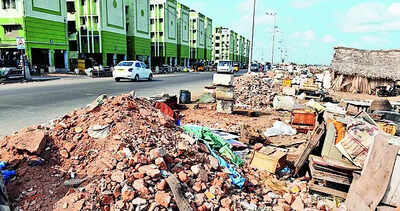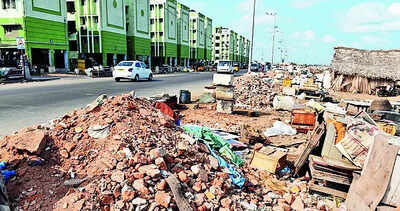NEW DELHI: With India generating about 150-500 million tonne of construction & demolition waste every year which poses serious challenges including air and water pollution, the Centre has notified rules to manage and recycle it under an extended producer responsibility (EPR) framework that makes it mandatory for every producer to dispose and manage such waste in an environmentally sound manner with effect from April 1 next year.
Absence of effective rules currently leads to unauthorised dumping due to lack of space for disposal, and improper mixing with biodegradable waste.
Currently, the National Capital Region (NCR) alone generates 6,303 tonnes of C&D waste per day. Though almost 78% of the waste is processed per day in the region, other parts of the country don’t have records of processing that much waste.
The rules, notified by the environment ministry last week, will now make it mandatory for producers, recyclers, operators of waste storage facilities and collection points to register themselves on a dedicated portal for tracking and monitoring of their specific roles and time-bound targets in properly disposing of those waste.
Every registered producer will have specific targets for recycling of waste under the EPR framework. Non-compliance of the rules will attract fines (environmental compensation) from state and central pollution control boards/committees as per guidelines, depending on the loss and damage the waste may cause to the local environment including air and water quality.
“The payment of environmental compensation shall not absolve the producer from the extended producer responsibility, and the unfulfilled extended producer responsibility for a particular year shall be carried forward to the next year and so on for a period up to three years,” said the notification.
The rules will, however, not apply for waste generated from defence projects, atomic energy sites and natural disasters.
Under the rules, Bureau of Indian Standards and Indian Road Congress will also prepare code of practices for use of recycled materials in road construction.
The money collected as environmental compensation under this rule will be kept by the CPCB in a separate account and will be utilised only for collection and recycling of uncollected, legacy and orphan waste.
The urban development and municipal bodies of the states/UTs will be responsible for formulation and implementation of waste management policy, and issuance of directives for management of waste and utilisation of processed waste in its jurisdiction.
These agencies will also be responsible for setting up of intermediate waste storage facilities and processing sites on local or regional or cluster basis within a year of notification of these rules.


